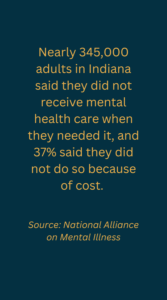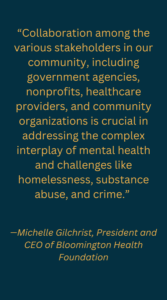It’s no secret that, like so many other communities across the country, Bloomington is facing a mental health and substance abuse crisis.
Over the past decade, the number of adults in Indiana who experienced mental illness rose to nearly 21%, according to research published by the Indiana Family and Social Services Administration. In 2021, according to the National Alliance on Mental Illness, nearly 345,000 adults in Indiana said they did not receive mental health care when they needed it, and 37% said they did not do so because of cost.
 People struggling with their mental health can find themselves marginalized and isolated, in large part because they feel abandoned by the people and systems that are actually intended to help them in their time of need. And many who are suffering don’t access the resources they desperately need because they don’t know what services are available or how to use them.
People struggling with their mental health can find themselves marginalized and isolated, in large part because they feel abandoned by the people and systems that are actually intended to help them in their time of need. And many who are suffering don’t access the resources they desperately need because they don’t know what services are available or how to use them.
These challenges can exacerbate the more visible issues in our community like homelessness and substance abuse. For example, without the right treatment and care, mental illness can hinder efforts to keep or secure stable housing and employment, perpetuating homelessness. And when people turn to drugs or alcohol as a way to cope with untreated mental health conditions and the stress of homelessness, a cycle of substance abuse begins that is difficult to break without comprehensive intervention.
And mental illness doesn’t only impact individuals and families. The economic burden of untreated mental illness on communities in Indiana results in $4.2 billion spent annually, according to an October 2023 study by the Indiana University Richard M. Fairbanks School of Public Health. These costs are attributed to premature mortality, productivity losses, direct health care, incarceration, sheltering of the unhoused, and caregiving.
While nonprofits, lawmakers, clinicians, and businesses are each doing their own part to address the mental health crisis, Bloomington Health Foundation sees an opportunity to take a step back and look more holistically at these issues — and to coordinate efforts to be even more effective as a community.

Michelle Gilchrist, President and CEO of Bloomington Health Foundation
“Collaboration is the most powerful tool we can leverage to give individuals and families across our community equal opportunities to care for their health and address the mental illness crisis our state is facing,” says Michelle Gilchrist, President and CEO of Bloomington Health Foundation. “As local leaders in community health advocacy, we are focused on leading and convening initiatives to support mental health, including emotional, psychological, and social wellbeing. By forming strategic community partnerships between our neighbors in local business, philanthropy, government, and social services, we work together to apply our resources where they’ll make a sustainable impact.”
At a state level, coordinated action has made a huge impact. Doug Huntsinger, Executive Director for Drug Prevention, Treatment, and Enforcement in the State of Indiana Governor’s office, emphasizes what has been achieved through collaboration.
“Over the last seven years, we’ve equipped communities with the tools to develop and enhance their collaborative, evidence-based treatment and recovery infrastructure,” Huntsinger says. “These efforts have resulted in the addition of 440 new recovery residence beds, the implementation of eight new harm reduction street outreach teams, and the expansion of our behavioral health initiative in Indiana’s judicial and correctional system.”

Doug Huntsinger, Executive Director for Drug Prevention, Treatment, and Enforcement in the State of Indiana Governor’s office
Huntsinger commends Indiana’s ongoing work to increase mental health outcomes, including ensuring that naloxone — a life-saving medication that reverses the effects of overdoses — is available for free to all Hoosiers, and launching Treatment Atlas, an addiction locator service which has given more than 21,000 Hoosiers access to quality treatment.
Thanks to these statewide efforts, Indiana’s overdose death rate dropped an astounding 18% in 2023.
Now, we need to replicate that state-level commitment and collaboration here in greater Bloomington so people can get access to the support they need, says Gilchrist.
Formalizing our Community’s Commitment to Mental Health: Launching a New Mental Health Collaborative in Greater Bloomington
In May, at a gathering of more than 100 diverse stakeholders, BHF announced the formation of a first-of-its-kind Mental Health Collaborative — a coordinated effort to drive local and state-level action to improve mental health outcomes in greater Bloomington.
The Mental Health Collaborative was launched following a Mental Health Summit that took place in late 2023 where the “boots on the ground” in the mental health and addiction space gathered to paint a full picture of what’s working well and what needs better funding and coordination.
During that conversation, stakeholders from nonprofit agencies, local businesses, healthcare services, and government had the opportunity to share their perspectives about the challenges that they face on a day-to-day basis. The working group collaboratively developed a list of initial priorities for improving utilization rates of mental health care resources — which included better peer support and a universal treatment tracking system.
“Collaboration among the various stakeholders in our community, including government agencies, nonprofits, healthcare providers, and community organizations is crucial in addressing the complex interplay of mental health and challenges like homelessness, substance abuse, and crime,” says Gilchrist. “We must work together to develop holistic approaches that address the root causes of these issues and create pathways to recovery and stability for everyone in our community. And, out of the Mental Health Summit, we identified some important first steps we must take.”
Establishing a coalition of Peer Support Navigators
 A critical part of the mental health care pathway is having someone to walk with during the journey. That’s why peer support is so important. A coalition of dedicated navigators — ideally, a peer or someone who has been there — can reestablish healthy relationships and guide those who are seeking care.
A critical part of the mental health care pathway is having someone to walk with during the journey. That’s why peer support is so important. A coalition of dedicated navigators — ideally, a peer or someone who has been there — can reestablish healthy relationships and guide those who are seeking care.
Developing a universal tracking system that would allow coordinated efforts
Right now, many of the organizations in our community are using different tracking systems for treatment progress and medical history, so clinicians and social workers lack visibility to coordinate resources and share information. With a universal system, we can reduce redundancies so that service providers can more effectively deliver care.
Exploring peer support programs for the incarcerated
Community-wide, there have been ongoing discussions about Integrated Reentry and Correctional Support (IRACS) teams. These teams are designed to guide each step of the journey through the criminal justice system — providing peer support within jails to meet people where they are, getting those who are being released to the appropriate recovery resources and treatment, and supporting loved ones and system partners along the way. IRACS peers provide another layer of support for those in need.
There are many communities that have successfully launched IRACS programs with a great deal of success, and in our area, our county leaders have been in countless discussions with community agencies to determine if IRACS is a good fit for our community and how to secure the funding and staffing support it needs long-term. We believe an IRACS program in Bloomington could be an integral part of comprehensive, coordinated intervention that creates lasting change.
BHF Commits $1M to Jumpstart Meaningful, Lasting Change
Bloomington Health Foundation has committed $1 million to kickstart the Mental Health Collaborative, with plans to raise additional funds and build critical partnerships.
“We are convening and supporting the working groups already hard at work to identify the underlying challenges and develop comprehensive solutions related to mental health care and substance abuse treatment and prevention,” says Gilchrist. “This collaborative approach will ensure that our community can effectively address these complex issues and create lasting, meaningful change. Under-treated mental illness and substance abuse affects each and every one of us, whether we realize it or not. Our hope is that when we bring our unique skills together, we can change the course of mental health outcomes in our community.”
Stay up to date with the latest insights and news about overcoming Bloomington’s mental health and substance abuse crisis
Sign up for our email newsletter for ongoing ways to get involved at bloomhf.org/newsletter.
About the Mental Health Collaborative
The Mental Health Collaborative is a multiyear, multimillion-dollar investment dedicated to enhancing mental health outcomes in and around Monroe County, Indiana. By bringing together business leaders, service providers, nonprofits, lawmakers, clinicians, and concerned citizens, we aim to address the significant and complex challenges that impact mental health access and support. Learn more at bloomhf.org.




